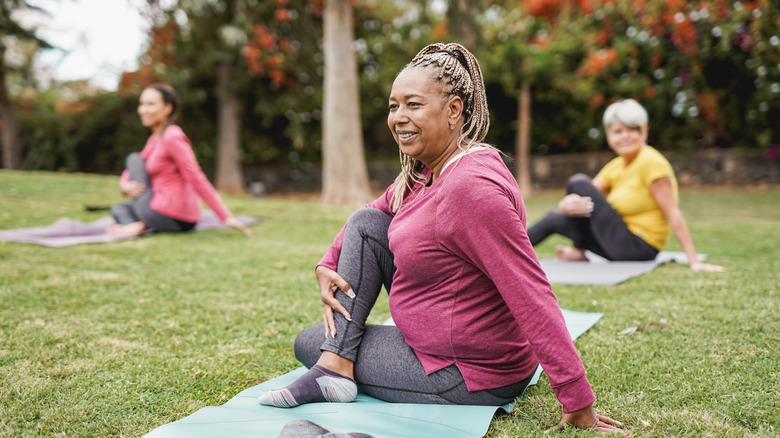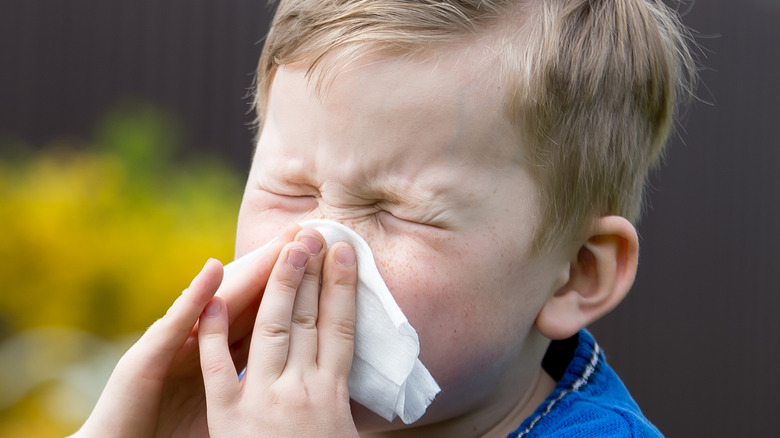What Is An Immune Kettle And Why Should You Focus On It
The pandemic has brought terms like "immunity" to the forefront of health discussions and made us realize that we need to be proactive about taking care of our bodies. One way to do that is by understanding and creating an "immune kettle" (per MindBodyGreen). Dr. Kenneth Bock, a functional medicine practitioner, developed the concept of an "immune kettle" — it involves viewing our immunity and general health together as one and includes ways to improve our health by taking preventive steps.
According to MindBodyGreen, Dr. Bock describes layers and factors that go into understanding one's "immune kettle," including genetic predispositions, environmental toxins, diet, allergies, hormone imbalances, infections, and stress. In fact, he emphasizes that stress is one of the most important parts of our "immune kettle" that we can control, and often one of the biggest threats to our immunity. If you want to understand your immunity and take control of your health, there are ways to do so by learning about and creating your own "immune kettle."
Stress is a major component
The immune system is made up of billions of cells traveling through your bloodstream, as well as organs and tissues. It serves the purpose of fighting off disease, viruses, bacteria, and cells that are cancerous (via SimplyPsychology). When experiencing stress, our immune systems can lose their ability to fight off these invaders because stress hormones can weaken the effectiveness of the cells helping to defend immunity. This makes it extremely important to reduce stress.
According to Healthline, stress can be reduced in ways that fit any schedule, lifestyle, and ability. Physical activity, such as going for a walk or a bike ride, is a great way to reduce stress, especially if conducted regularly. Maintaining a healthy diet low in added sugars and ultra-processed foods, as well as reducing caffeine intake, are other ways that can reduce stress. Self-care, which is a term you've likely heard quite a bit, is an important step for mediating stress, but it's important to remember that self-care is unique for each person. While one person may practice self-care by reading an enjoyable book, another person may practice self-care by sipping hot tea. Spending positive time with family and friends is both a form of self-care and a healthy way to reduce stress. The steps you take to reduce stress contribute to the strength of your "immune kettle."
Create a healthy immune kettle
Aside from keeping stress at bay as best as possible, there are other things that can be done to create a healthy "immune kettle." Understanding your unique genetic predispositions, as well as allergies and sensitivities, is a good place to start, Dr. Bock told MindBodyGreen. The goal is to keep a low "immune kettle" and not to let it boil over— you don't want to put yourself in a place where your immunity is susceptible to invaders that can threaten your health. Dr. Bock makes a point to note that the health of a person's "immune kettle" can be strengthened, regardless of genetic predispositions and other factors.
The Harvard Medical School reports that immunity can be made stronger by getting adequate sleep on a regular basis, staying up-to-date with vaccinations, avoiding smoking, and only drinking alcohol in moderation. It's also vital to take actions that will reduce the risk of infection, such as washing your hands regularly. Eating a diet filled with fruits and vegetables, maintaining a healthy weight, and regularly exercising are additional ways that immunity can be boosted. When in doubt, consult with your healthcare provider to learn how you can increase your own unique "immune kettle."



